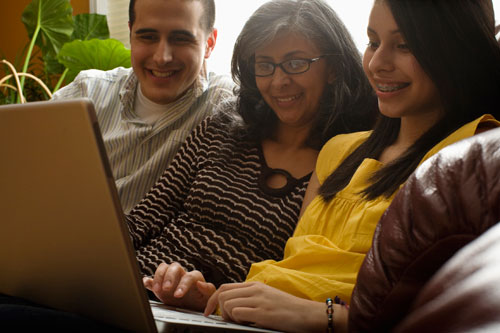Facebook, over the past year, has reached a critical mass. No longer relegated to hip college students trying to find dates, the Facebook community now includes everyone from 20-something celebrities to grandmothers and sewing circles.
As a 20-something myself, I thought it would be interesting to profile the ways in which Facebook is changing how my generation communicates with friends and family.
I am part of the first generation that will never long for a high school reunion; Facebook has made it more difficult for me to lose track of old acquaintances. Whenever I go on Facebook, I see a stream of all the things my friends are currently doing. Even if I don’t speak to them for three months at a time, there’s still a “connection.”
In the past, this type of passive communication on a mass scale was impossible. If I wanted to stay connected to a group of 15 friends from long ago, I might have sent letters, but it would have been far from efficient. I would have written the same things to each of them. The personal content of these letters would have been small compared to the informational pieces that would be the same in the other 14 letters. Facebook makes your information a kind of boilerplate. It becomes a given, so conversations with old friends can be a lot more productive when I do see those people. In a way, I never really lose my connection.
That feeling of social ties is the magic of a service like Facebook. My family, like a lot of other modern families, is spread out across the Unites States, from Florida to California. I also have family members overseas. I’m lucky if I see my entire family once a year. Yet, with the assistance of Facebook, I can apply the the same efficiency of staying connected with high school friends as with my family. My sister, for example, recently had her first child. I have met my niece only a handful of times since then, but she is constantly in my thoughts thanks to a stream of pictures and updates about how she’s doing. It’s a lot like the old family Christmas cards except it’s happening every single day of the year.
The Internet has come a long way in the last couple of decades, and we’re seeing some noticeable generational trends. For instance, one of my friend’s aunts “friended me” on Facebook, and I noticed that she had three times the number of Facebook friends as her nephew, despite the fact that she has only recently started to spend more time on the Internet. She spends more time on Facebook than he does. Yet he is part of the younger generation that grew up using the Internet.
The beauty of Facebook is in the packaging of the service. Almost every facet of Facebook is technology that existed from years before: e-mail, instant messaging, photo galleries, personal Web pages, RSS, etc. Facebook has taken these function, which young people have been able to do for the past decade, and made them more user-friendly, more accessible—for young and older generations alike.
Facebook is the second act in the people’s Internet Revolution; the first being America Online, which spurred the adoption of the Internet in the homes of ordinary Americans. In a similar fashion, Facebook is spurring the adoption of Internet use in demographics that have been dismissed as the non-Internet users. It gives people a reason to be online in a way that simply checking e-mail, the 1996 equivalent, did not. Facebook is active in a way that the general population may find more rewarding.
Instead of waiting for items to roll in addressed to you personally, as in the case of e-mail, you can take the initiative to find out about your friends without having to speak to them directly.
The ability to communicate (or not communicate) with your friends in different ways also heightens the ‘stickiness’ of the service. For example, it tells you who else is using Facebook right now. You can then exchange instant messages with any of them. There’s always one more thing to check, see, or do on Facebook. It’s like a never-ending dinner party and all your friends and family are invited.
Whether or not Facebook is a festive Christmas card or more of a raucous dinner party is up to the user (or non-user). Suffice to say, even if the Facebook service goes offline tomorrow, services like Facebook have changed the way we communicate in our society.
Become a Saturday Evening Post member and enjoy unlimited access. Subscribe now



